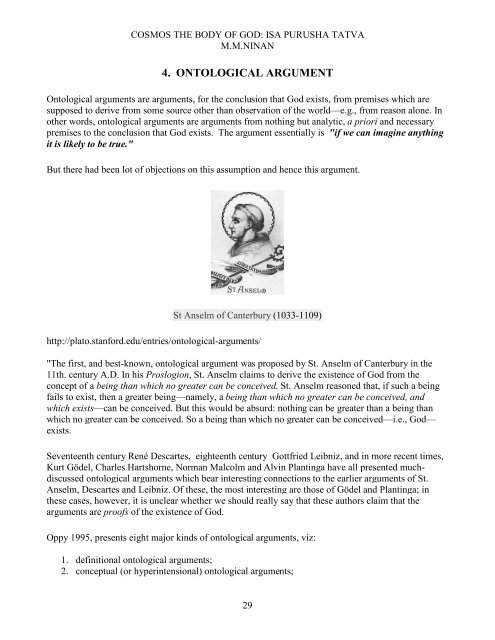Create successful ePaper yourself
Turn your PDF publications into a flip-book with our unique Google optimized e-Paper software.
COSMOS THE BODY OF GOD: ISA PURUSHA TATVA<br />
M.M.NINAN<br />
4. ONTOLOGICAL ARGUMENT<br />
Ontological arguments are arguments, for the conclusion that <strong>God</strong> exists, from premises which are<br />
supposed to derive from some source other than observation <strong>of</strong> the world—e.g., from reason alone. In<br />
other words, ontological arguments are arguments from nothing but analytic, a priori and necessary<br />
premises to the conclusion that <strong>God</strong> exists. The argument essentially is "if we can imagine anything<br />
it is likely to be true."<br />
But there had been lot <strong>of</strong> objections on this assumption and hence this argument.<br />
St Anselm <strong>of</strong> Canterbury (1033-1109)<br />
http://plato.stanford.edu/entries/ontological-arguments/<br />
"The first, and best-known, ontological argument was proposed by St. Anselm <strong>of</strong> Canterbury in the<br />
11th. century A.D. In his Proslogion, St. Anselm claims to derive the existence <strong>of</strong> <strong>God</strong> from the<br />
concept <strong>of</strong> a being than which no greater can be conceived. St. Anselm reasoned that, if such a being<br />
fails to exist, then a greater being—namely, a being than which no greater can be conceived, and<br />
which exists—can be conceived. But this would be absurd: nothing can be greater than a being than<br />
which no greater can be conceived. So a being than which no greater can be conceived—i.e., <strong>God</strong>—<br />
exists.<br />
Seventeenth century René Descartes, eighteenth century Gottfried Leibniz, and in more recent times,<br />
Kurt Gödel, Charles Hartshorne, Norman Malcolm and Alvin Plantinga have all presented muchdiscussed<br />
ontological arguments which bear interesting connections to the earlier arguments <strong>of</strong> St.<br />
Anselm, Descartes and Leibniz. Of these, the most interesting are those <strong>of</strong> Gödel and Plantinga; in<br />
these cases, however, it is unclear whether we should really say that these authors claim that the<br />
arguments are pro<strong>of</strong>s <strong>of</strong> the existence <strong>of</strong> <strong>God</strong>.<br />
Oppy 1995, presents eight major kinds <strong>of</strong> ontological arguments, viz:<br />
1. definitional ontological arguments;<br />
2. conceptual (or hyperintensional) ontological arguments;<br />
29


















